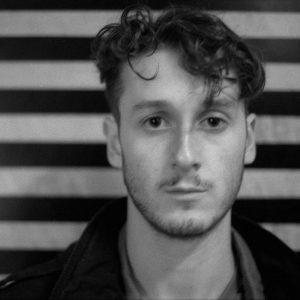KOVI KONOWIECKI ’14

After graduation, Kovi moved to Israel to play with a professional soccer club called Hapoel Kfar Saba F.C. After some time, he realized that photography was what he really wanted to be doing with his life. We spoke with Kovi to learn how this revelation has impacted his journey since.
*Since the interview, Kovi is working as a Freelance Artist / Photographer and has won several awards for his work.
PHOTOGRAPHER
Los Angeles, California/London
WFU Class of 2014
Major: Communication with a Media Concentration
Minor: English
DeacLink: Tell us what you’re up to right now.
Kovi: I just finished my MA in Photography from University of the Arts London and have two if my images being displayed at the National Portrait Gallery as part of the Taylor Wessing Photographic Portrait Prize.
I am currently polishing up a series called ‘Delivering Flowers to Grandpa Jack’, which I began creating to capture the uniqueness of Long Beach, California—the people and places that I thought made it different from everywhere else. But as I spent more time documenting my hometown, I realized that its uniqueness does not stem from the people who live there or the streets that comprise it. Rather, it is the things that don’t stand out that make Long Beach like nowhere else for me. The series pays tribute to the elements of Long Beach that many would find commonplace and un-extraordinary, highlighting the beauty of familiarity that can transform the mundane of one’s hometown into something very personal. The photographs’ devotion to the elements of the everyday signifies how the special feeling one associates with their hometown does not come from the place itself—it comes from being from the place. Undefined by a specific era, the people depicted in the series exist in a setting created by my perception of home—a place that remains intimate and ageless—an embodiment of the feeling that no matter how many years pass, and no matter how many things change, there are certain things that never change.
DL: How did you end up in a Masters program? What were your biggest incentives for enrolling?
K: Going back to school was really appealing for me at the time– the process of collaborating and being in a creative environment was really exciting to me. Because I played soccer at Wake, I never really had that experience in college– to be completely immersed and driven by photography.
DL: How much did your studies or Wake in general inform or drive your career path?
K: Wake allowed me to really figure out who I was, both an as individual and as an artist. I was rather different in a predominantly homogenous community, which perpetuated many of my artistic endeavors. I wanted to create platforms for social change.
I was also fortunate enough to have some really engaging professors that allowed me to form some of the ideas that are the basis for much of my work today.
DL: What do you think Wake arts could have done to have better prepared students for life after graduation?
K: I think college is all about finding out who you are. For some it takes longer than others. For others it never really happens. I think Wake could do a better job of giving students more opportunities to explore creative outlets. It is very easy to get sucked into the code of getting good grades.
DL: What’s the hardest part about breaking into your field?
K: It is highly competitive! Everyone’s a photographer these days. It takes a lot of trust in yourself and your sense of authorship. It also takes a lot of patience, as it can take years to establish who you are as an artist.
DL: How did you like living and producing work in London, versus back home in LA? Is there a significant difference in the quality of your work, the ease of producing, and the reception of your work, between the two places?
K: I like the negotiation between LA and London. I sort of get the best of both worlds. London is like an incubator for me, I get tons of inspiration from all of the creative outlets. LA is a more of a place for production and reflection for me. Everything runs at a slower pace in LA, which can be great at times.
DL: What has surprised you the most about the art scene in London? Do you have any advice for students wanting to move to move there?
K: If you put in the effort to make connections and see what is out there, London can really be a fantastic place to grow. My biggest advice would be to take initiative– there is too much going on to sit back.
DL: How about in LA?
K: With regards to LA, the art scene is growing a lot. There seems to be a movement of people coming from NY (I think people are starting to get a bit tired of the cold). But like London, there are tons of collaborations and opportunities waiting to happen.
DL: What and where is next for you?
K: I wish I knew…I am using this time to reflect and figure out where I want to be… and where will be best for my career.
DL: What’s the best kernel of advice you can think to pass on, or currently go by?
K: Be patient and let things happen naturally. And the work is always more important than self promotion or getting your name out there– the work has to always be at the forefront.
